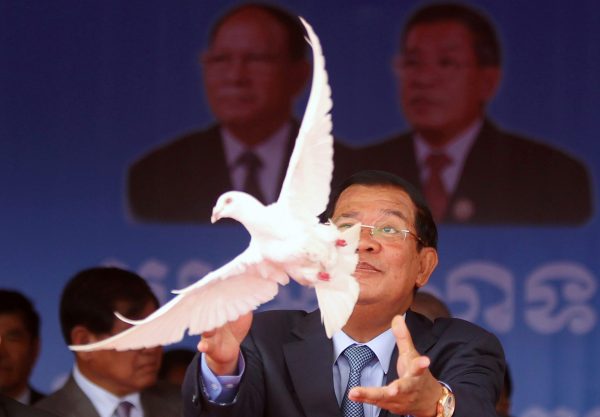Government threats to, and sometimes violent crackdowns on, critics and power contenders continue unabated. After more than 30 years in power, Prime Minister Hun Sen still shows no signs of wanting to retire from his political struggles.
Before the 4 June 2017 commune elections, Hun Sen ramped up diatribes and displayed acts of intimidation against members of the opposition Cambodian National Rescue Party (CNRP). He rang alarm bells by saying that opposition victories would bring the country back to chaos and instability. He threatened to seize the personal property of CNRP President Sam Rainsy (who was still in exile for political reasons) and ‘burn down’ the houses of his opponents.
The threats Hun Sen issued against his opponents aimed at sending a clear message that they would not be allowed to win in future elections. Defence Minister General Tea Banh also warned that the military would ‘smash the teeth’ of those who protested a Cambodian People’s Party (CPP) win.
Even after the commune elections, in which his CPP won a majority, Hun Sen escalated the war of words, warning the opposition against taking any action that would undermine the election result. Most shocking was when he told his opponents to prepare their coffins and expressed his willingness to ‘eliminate’ between 100 and 200 of them.
There is no reason to think that Hun Sen, now 64, is beginning to mellow out and get tired of politics. Age is never a good determinant of leaders’ political lifespans in countries like Cambodia, and neither is political unpopularity or personal fatigue.
There are several reasons why Prime Minister Hun Sen will not call it quits any time soon. The first is that he cares about his political legacy, beginning with the overthrow of the murderous Khmer Rouge regime in 1979 and the progress he thinks his party has since brought to the country. After all, he has presided over one of the fastest-growing economies in Asia. High economic growth rates continue to provide him with a source of legitimacy.
The second reason is that Hun Sen thinks that he has enough bullets to keep his opponents at bay. Since the violent putsch he led in 1997 that resulted in the downfall of his then co-prime minister Prince Norodom Ranariddh (leader of the royalist party that won the UN-organised election in 1993), he has emerged as the country’s dominant political leader. The multiparty system has been turned into a hegemonic party system. State institutions, particularly the armed forces and the judiciary, have become more personalised and politicised than ever before. Opposition officials are correct when admitting that they have no means of violence to wage any war against the ruling party, and Hun Sen knows this to be true.
Still, what Hun Sen covets most is not absolute power — he is smart enough to know that seeking it would be self-destructive — but rather achieving enough security to remain in power comfortably. Speculation about the possibility of the CPP’s attempt to eliminate the opposition, for instance, is contradicted by the fact that the CNRP was allowed to compete in elections and win seats.
What Hun Sen fears most is the ultimate power of political democracy — the third reason why he will not retire from politics. His bellicose speeches and unstatesman-like manner reveal a great deal of truth about his insecurity rooted in hidden political weaknesses.
What makes the CPP elite feel less secure now is that their powerbase is much shakier than they want it to be. An election loss might result in greater factionalism within the party — and possibly intra-party violence. The armed forces are weakly held together at the top by Hun Sen, without whom the institution might even engage in factional warfare.
The ruling elite also think they cannot afford to lose power in a political environment where Hun Sen — and his family, as well as loyalists — feel that an election loss might subject them to prosecution, despite assurances from their foes to the contrary.
The trouble with countries like Cambodia — long afflicted by the persistence of weak state institutions, as well as a lingering history of betrayal, retribution and bloodshed — is that good intentions alone can never be a good enough foundation for trust-based peacebuilding.
The blood politics of survival is still evident in Cambodia and the hegemonic party system remains prone to tension and violent conflict. In this fragile environment, democracy is unlikely to survive or thrive unless the ruling elite’s insecurity is addressed and their powerbase begins to implode to the point where their weak domination ends.
Sorpong Peou is a Professor with the Department of Politics and Public Administration at Ryerson University, Toronto.

